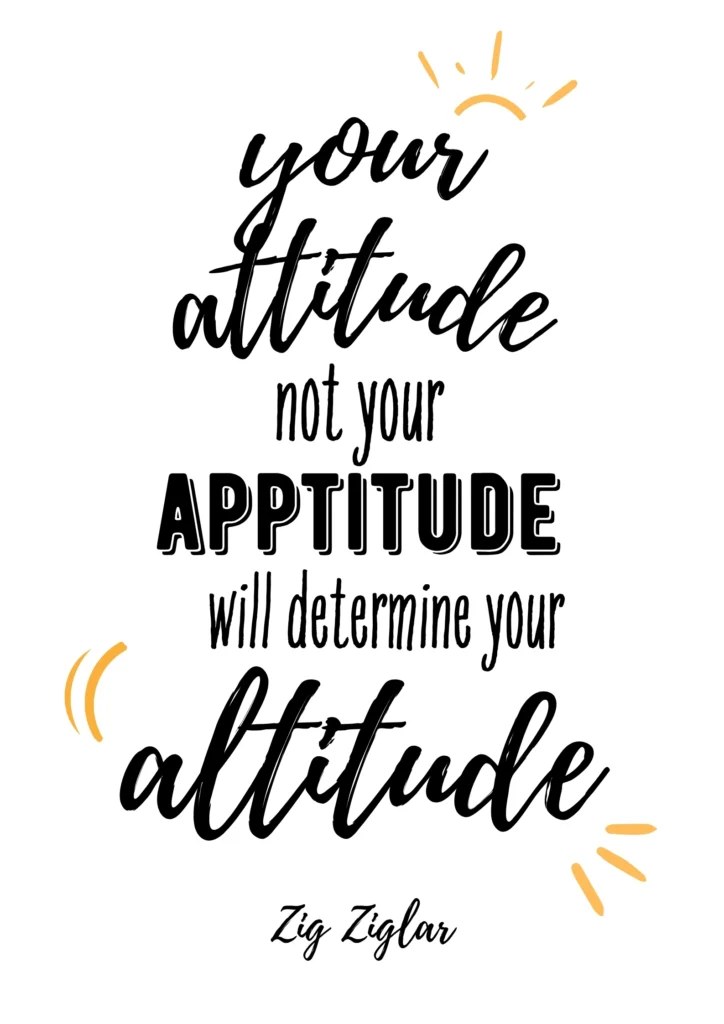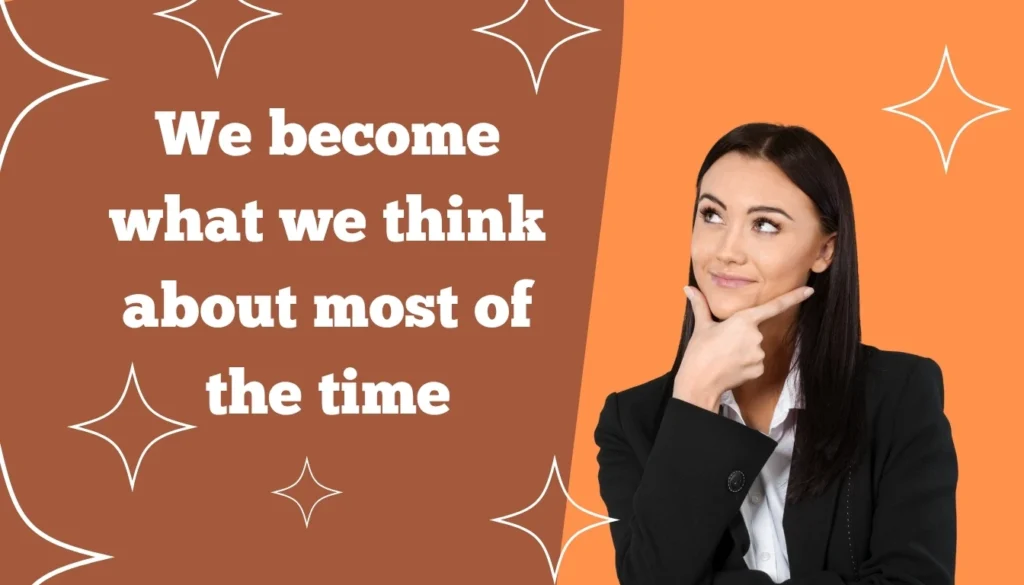Your attitude shapes everything. It decides if you succeed or fail. It controls how others see you. Most importantly, it determines your happiness. “Attitude: How This Power Word Can Make You Better” isn’t just a catchy phrase. It’s a truth that can change your life.
Embracing a confident mindset further amplifies the positive effects of a strong attitude, enabling you to face challenges with assurance
The legendary Earl Nightingale once said,
“Our attitude toward life determines life’s attitude toward us.”
Think about that for a moment. Your mindset creates your reality.
Bob Proctor taught millions about the power of positive thinking. He believed attitude was the foundation of all success. When you understand this simple truth, everything changes. Your relationships improve. Work gets better, and your health becomes stronger.
This isn’t about fake smiles or pretending everything is perfect. Real attitude comes from deep inside. It’s about choosing how you respond to life’s challenges. It’s about seeing opportunities where others see problems.
As per Zig Ziglar ,
“Your attitude, not your aptitude, will determine your altitude.”

What Exactly Is Attitude?
It is your mental position. It’s how you think about yourself and the world around you. Some people call it your mindset. Others say it’s your outlook on life.
At its core, attitude is more than just a passing emotion or mood. Psychologists describe it as a combination of three key components:
1. Cognitive: What we think and believe about something
2. Affective: How we feel about it
3. Behavioral: How we act in response to it
These elements shape how you respond to people, situations, and even your own experiences. Your attitude can be positive, negative, or somewhere in between, often shaped by your life experiences, the people you surround yourself with, and the culture you’re part of.
Think of attitude as a filter. Everything you experience passes through this filter first. A positive attitude lets good things get through easily. It also aids in identifying positive aspects during challenging times. A negative attitude does the opposite. It blocks out the good and magnifies the bad.
Earl Nightingale explained it perfectly: “We become what we think about most of the time.” Your thoughts create your attitude. Attitude creates your actions. Your actions create your results.
Bob Proctor added another layer to this understanding. He said attitude is really about your feelings: your emotional state significantly influences how you act and interact with the world around you. For example, when you feel confident, you take bigger risks. Similarly, when you feel grateful, you tend to attract positive experiences into your life.
Your attitude affects everyone around you, too. People can sense your energy the moment you walk into a room. They decide if they want to be near you or avoid you. This phenomenon happens in seconds, often before you even speak.
The Science Behind Attitude
Scientists have studied attitude for decades. They’ve found something amazing. Your brain changes based on your thoughts and feelings. This phenomenon is called neuroplasticity.
When you think positive thoughts repeatedly, your brain creates new pathways. These pathways make positive thinking easier over time. It’s like creating a mental highway for good thoughts.
The opposite happens with negative thinking, too. Worry and fear create their pathways. The more you use them, the stronger they become. This phenomenon explains why some people seem naturally optimistic while others always see the worst.
Research shows that people with positive attitudes live longer. They have fewer heart problems. They recover from illness faster. Their immune systems work better. Even their pain levels are lower.
Dr. Martin Seligman studied the subject for years. He found that optimistic people earn more money. They have better relationships. They’re more creative at solving problems. They bounce back from failure quicker.
Your attitude even affects your memory. Happy people remember good events more clearly. They also forget bad experiences faster. Such behavior creates an upward spiral of positivity.
How Attitude Controls Your Success
Success isn’t just about talent or luck. It’s mostly about attitude. Earl Nightingale discovered this truth early in his career. He studied successful people for years. The one thing they all had in common was a winning attitude.
Your attitude influences how you cope with rejection. Everyone experiences “no” at times. Successful individuals view rejection as a form of redirection. They gain insights from it and progress forward. Those with negative attitudes tend to give up too quickly.
Attitude also controls your persistence. When you believe in yourself, you keep trying. You find new ways to solve problems. You don’t quit when things get tough.
Bob Proctor often said,
“Persistence is the expression of the will to win.”
Think about two people applying for the same job. One walks in confidently and positively. The other seems nervous and doubtful. Who do you think gets hired? The person with the better attitude usually wins, even if their skills are equal.
Your attitude affects your learning, too. When you believe you can improve, you do. Students with growth mindsets outperform those with fixed mindsets. They see challenges as opportunities to get better.
Successful people also use attitude to handle stress effectively. Instead of allowing pressure to overwhelm them, they perceive it as excitement. They understand that feeling nervous indicates something significant is occurring. This simple change alters everything.

The Attitude of Gratitude
Gratitude might be the most powerful attitude of all. When you focus on what you have, you feel rich. When you focus on what’s missing, you feel poor. It’s that simple.
Earl Nightingale practiced it daily. He would start each morning by listing things he was thankful for. This simple habit changed his entire outlook on life. He believed that gratitude acted as a magnet, drawing in more positive experiences.
Bob Proctor taught the same principle. He believed that grateful people were the happiest. They achieved more because they operated from a place of abundance, not scarcity.
Research supports this completely: grateful individuals sleep better, have stronger relationships, are more generous to others, and tend to exercise more and eat healthier foods.
Gratitude also changes how you see problems. Instead of asking “Why me?” you start asking “What can I learn?” This shift opens up new possibilities. Problems become stepping stones instead of roadblocks.
Try this simple exercise. Every night before bed, write down three things you’re grateful for. They can be big or small. Maybe you’re grateful for your health, your family, or just a good cup of coffee. Do this for one week and watch what happens.
Changing Your Attitude: Practical Steps
The good news is that attitude can be changed. It takes work, but anyone can do it. The first step is becoming aware of your current attitude. Pay attention to your thoughts throughout the day. Are they mostly positive or negative?
Start your day with intention. Choose how you want to feel before you get out of bed. Earl Nightingale called this “programming your mind for success.” Spend five minutes visualizing a great day ahead.
Be mindful of what you allow into your mind. The books you read, the shows you watch, and the people you associate with all influence your attitude. If you fill your mind with negativity, you’ll produce negativity. Conversely, if you fill it with quality, you reap positive results.
Bob Proctor recommended surrounding yourself with positive people. He said you become like the five people you spend the most time with. If they’re negative, you’ll become negative too. If they’re positive and growing, you’ll grow too.
Change your language. Instead of saying “I have to,” say “I get to.” Instead of “This is terrible,” try “This is challenging.” Small word changes create big attitude shifts.
Practice the “24-hour rule.” When something awful happens, give yourself 24 hours to feel upset. Then, consciously choose to move forward. Don’t let temporary setbacks create permanent attitude problems.
Exercise regularly. Physical movement changes your brain chemistry. It releases endorphins that make you feel good. Even a short walk can shift your attitude dramatically.
Attitude in Relationships
This power word affects every relationship in your life. People are drawn to those with positive energy. They avoid those who constantly complain or criticize.
Think about your favorite people. What’s their attitude like? Chances are, they’re optimistic, encouraging, and fun to be around. They make you feel better about yourself. This isn’t a coincidence.
In marriage, attitude matters more than compatibility. Couples with positive attitudes work through problems together. They assume good intentions from each other. They focus on solutions, not blame.
Parents with good attitudes raise happier children. Kids learn more from what they see than what they hear. When you model positivity, your children absorb it naturally.
At work, attitude determines your success more than skills do. Employers promote people they enjoy being around. They give opportunities to those who make the workplace better, not worse.
Your attitude in relationships is contagious. When you’re genuinely interested in others, they open up to you. When you’re critical or judgmental, they shut down. You get back what you give out.
Overcoming Challenges
Changing your attitude can be difficult. Everyone faces unexpected challenges in life. The key is to learn how to respond rather than react. As Earl Nightingale said,
“We can let circumstances control us, or we can take charge and govern our lives from within.”
When facing significant challenges, concentrate on what you can control. You cannot control what happens to you, but you can control your response. This is where your true power resides.
Break big problems into smaller pieces. A mountain looks impossible to climb from the bottom. But one step at a time, anyone can reach the top. The same principle applies to attitude challenges.
Find meaning in your struggles. Bob Proctor believed that every problem carried within it the seed of an equal or greater benefit. Look for the lesson and ask yourself what this experience is trying to teach you.
Don’t try to change everything at once. Pick one area of your attitude to work on. Maybe it’s being more patient with your family. Or consider focusing on maintaining a positive attitude during traffic congestion. All improvements add up to significant changes
Get help when you need it. Sometimes, attitude problems run deep. A counselor, coach, or trusted friend can provide a perspective you can’t see for yourself. There’s no shame in asking for support.
The Ripple Effect of Good Attitude
Your attitude doesn’t just affect you. It spreads to everyone around you. Like dropping a stone in still water, it creates ripples that go far beyond what you can see.
When you’re positive at work, your coworkers feel it. They start smiling more. They complain less. The whole atmosphere changes. Productivity goes up. People enjoy coming to work.
At home, your attitude sets the tone for your family. When you come home cheerful and grateful, everyone relaxes. When you’re stressed and negative, tension fills the air. Children are especially sensitive to these emotional currents.
Your attitude affects strangers, too. The clerk at the store, the person behind you in line, and the driver in the next car all feel the energy you project. A smile and kind words can turn someone’s whole day around.
This ripple effect explains why it is so powerful. When you change your attitude, you begin to change the world around you. One person with a truly positive attitude can influence hundreds of others.
Earl Nightingale understood this principle deeply. He believed that spreading a positive attitude was one of the highest forms of service. Through his radio programs and books, he touched millions of lives. His positive attitude is still rippling outward today.

Your Attitude, Your Choice
Here’s the most important truth about attitude: it’s always your choice. No matter what happens to you, you get to decide how you respond. This is your greatest power as a human being.
Viktor Frankl learned this lesson in the worst possible circumstances. As a prisoner in Nazi concentration camps, he discovered that his captors could take everything from him except one thing—his attitude. He chose to find meaning and hope even in that darkness.
You face nothing that difficult. Yet the same principle applies. Your boss might be difficult, finances might be tightm health might not be perfect. But your attitude toward these things remains your choice.
Bob Proctor often said, “You have the ability to choose your response to any situation.” This isn’t positive thinking fluff. It’s a fundamental truth about human nature. You are not a victim of circumstances unless you choose to be.
This doesn’t mean ignoring real problems or pretending everything is fine. It means choosing responses that help rather than hurt. Looking for solutions instead of dwelling on problems. It means believing in your ability to grow and overcome.
Conclusion: The Power Is Yours
Attitude truly is a powerful word that can make you better. It’s not magic or wishful thinking. It’s a practical tool that anyone can use to improve their life.
Start today. Choose one small way to improve your attitude. Maybe it’s saying “thank you” more often. Perhaps it’s complaining less about traffic. Or it could be smiling at strangers you meet.
Remember Earl Nightingale’s wisdom: “We become what we think about most of the time.” Fill your mind with positive, constructive thoughts. Your attitude will follow, and your life will change.
Bob Proctor’s legacy reminds us that attitude is a choice we make every single day. Choose wisely. Your future self will thank you for it.
The power to transform your life through attitude lies within you right now. You don’t need anyone’s permission to start, nor do you need perfect circumstances. You just need to decide that you’re worth the effort.
Your attitude is waiting for you to take control. The question isn’t whether you can change it. The question is, will you?
The choice is yours. The power is yours. Your better life starts with your next thought.






